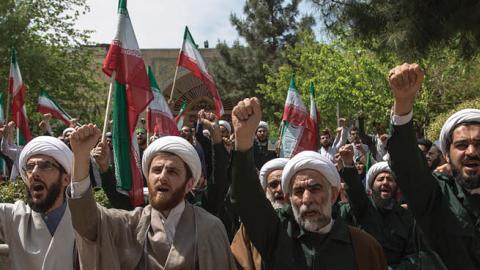Multiple reports have suggested that the Biden administration is considering taking Iran’s Islamic Revolutionary Guard Corps (IRGC) off the U.S. government’s Foreign Terrorist Organization list. As the senior Trump administration officials who led the process that recommended the designation in 2019, we feel compelled to explain why taking them off the list as a concession to tempt Tehran back into a nuclear proliferation deal would be dangerous — and would undermine the deal itself.
The terrorist list is one of the most powerful tools in our national security arsenal — a designation by the State Department and other agencies that not only economically isolates the entity in question but also imposes sanctions on any other group that provides it with material support (which can be anything from food and shelter to armaments). In essence, the designation imposes penalties on companies doing any sort of business with the sanctioned entity and opens these companies up to an increased risk of civil litigation on the part of the entity’s victims.
The Revolutionary Guard was founded in 1979 as the defender of the Islamic Revolution. IRGC members are the key enforcers of Tehran’s security operations at home and military operations abroad. In the Trump White House, we had voluminous historical and contemporary evidence of the group’s terrorist activities, and evidence that those activities had expanded following the signing of the 2015 Joint Comprehensive Plan of Action. We knew that the Revolutionary Guard was a key player in the Iranian regime’s expanding support and sponsorship of terrorism via proxies such as the Houthis, Hamas, Hezbollah and assorted Iraqi militias.
For example, in 2011, the IRGC participated in a plot to bomb a Georgetown restaurant to assassinate the Saudi ambassador to the United States — an attack that, if it had not been foiled by the FBI, would have also killed scores of innocent American civilians.
In 2015, a senior Iranian diplomat who was also a member of the IRGC was expelled from Uruguay’s capital, Montevideo, for planning an attack near the Israeli Embassy that would have killed both Israeli diplomats and Uruguayan civilians.
In 2018, authorities in Belgium, France and Germany arrested several IRGC operatives, including a credentialed Iranian diplomat, in a plot to plant a bomb to disrupt a political rally in Paris that would have killed scores of innocent civilians, including Americans.
That same year, two operatives were apprehended and charged for conducting covert surveillance of Israeli and Jewish facilities in the United States, as well as collecting identifying information about U.S. citizens and U.S. nationals who were members of an Iranian opposition group.
Designating the IRGC as a terrorist group was not an action we took lightly, as it would mark the first time the U.S. government would impose sanctions on an element of a foreign military and would raise serious concerns that our own armed forces would also be targeted with retaliatory sanctions. After an interagency debate that lasted for several months and concluded in early April 2019, the argument that the IRGC was not functioning as a normal military but rather as the operational terrorist arm of the Iranian regime won out.
All National Security Council meetings on the designation were carefully documented via the NSC’s Executive Secretariat, which has maintained these records in the NSC’s archives. These records are fully available to our successors if they wish to review the evidence that drove President Donald Trump’s decision to add the Revolutionary Guard to the terrorist list. The designation should not be reversed without an equally thorough process.
The evidence that the IRGC was a terrorist group when it was designated in 2019 was overwhelming and remains so today. While additional plots have been hatched, the IRGC found its resources and activities increasingly constricted by these and other sanctions.
The dramatic isolation of the Russian economy is a case study in how economically dominant the United States remains on the world stage. And while sanctions are not the solution to all problems, they are a critical tool when applied consistently and according to the strict rules that govern their use. Delisting the IRGC to persuade the Iranian regime to join a new nuclear proliferation pact will have the effect of undermining the credibility of U.S. sanctions. They will henceforth seem negotiable in nature and not tethered to the behavior they are designed to punish.
The goal of the new nuclear deal is purportedly to prevent Tehran from getting a nuclear weapon. If the Revolutionary Guard is delisted in pursuit of the deal, it will once again escalate its terrorist activities around the globe, dangerously disrupting the very peace the deal is supposed to ensure. No politically motivated diplomatic “victory” is worth the terrible defeat this would be for us all.
Read in the Washington Post
















